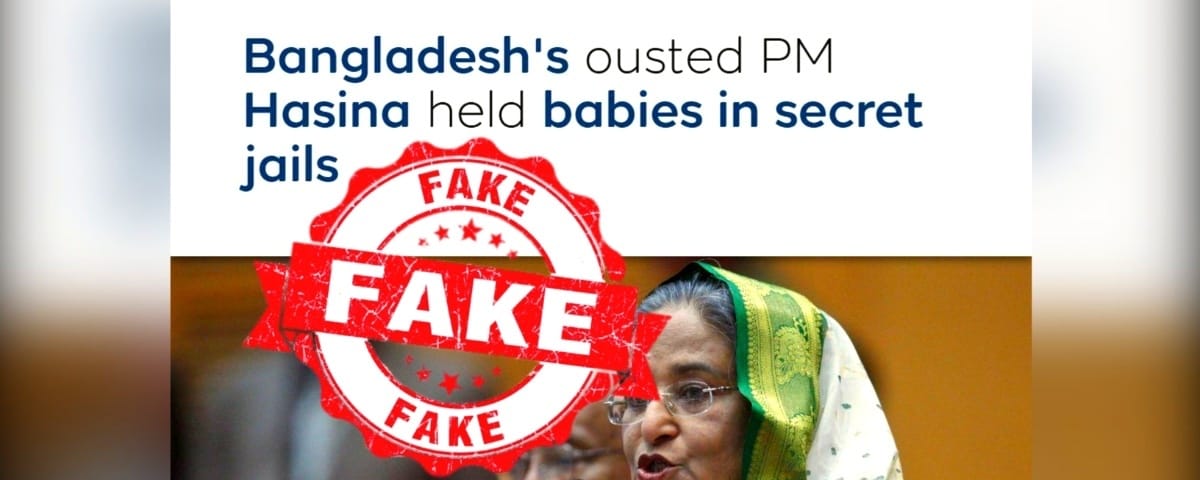Another day, another lie from Yunus and his disinformation gang

Prothom Alo, TRT WORLD, and a few other media recently published an article, “Women faced enforced disappearance; children not spared either,” or “Sheikh Hasina held babies in secret jails,” citing a report on "enforced disappearances" submitted to the Chief Advisor's office. The report, produced by a commission headed by the father-in-law of an FBI-wanted Al-Qaeda leader, is nothing more than a house of cards built on political motives and unsubstantiated claims.
The report's foundation crumbles under the weight of its own presumption. How can an executive body declare arrests as "baseless" when these cases are still under judicial review? Only the judiciary has the authority to evaluate evidence and determine the legitimacy of charges. The commission conveniently overlooked the well-documented participation of women in terrorist activities in Bangladesh. Neo-JMB and other terrorist organizations maintain active women's wings. In the past, members of their women's suicide squad committed suicide attacks. In the face of such stark evidence, the commission's dismissal of these arrests as 'baseless' strains credibility to the breaking point.
During counter-terrorism operations and raids, LEA frequently encounters women and children in terrorist hideouts. Those women and children not directly implicated in terrorist activities were rescued, moved to safe houses, and then handed over to their immediate relatives or legal guardians. However, in many cases, the family members often would not come forward to claim custody officially. Many of these women, while living with their terrorist partners, had already been ostracized by their own communities and severed ties with their families years ago. In cases where some family connections remain, relatives are often hesitant to come forward, fearing the stigma of terrorism associations.
During these periods when no immediate family members stepped forward, the women and their children remained in safe custody or shelters under law enforcement protection. When delays occurred with no family members willing to take custody, women and their children were transferred to the Women and Victim Support Center under the Dhaka Metropolitan Police. This arrangement cannot, by any reasonable standard, be termed an enforced disappearance.
In cases where female members or children showed signs of radicalization but have not engaged in violence, the Police would prioritize deradicalization efforts. However, while deradicalization and disengagement are globally recommended processes and are mentioned in many Bangladeshi government and institutional policy papers, Bangladesh lacks formal deradicalization centers.
Law enforcement agencies frequently took the initiative to address this issue, which was generally well-received. They informed family members and, in some instances, the courts while organizing in-house counseling sessions aimed at deradicalization involving experts, religious scholars, and former extremists. After these counseling periods, women and their children were returned to their family members.
Terrorist suspects differ from other criminal suspects, and their safe and smooth reintegration into society is crucial. There is a risk in allowing radicalized individuals to return to society while they remain connected to terrorist networks. These individuals can become victims of terrorism, may radicalize others in their community, and risk reoffending. Therefore, it is important to place them in the custody of family members and require them to report to the police regularly. This ensures that their progress in de-radicalization is monitored effectively.
The report's most egregious claim – those children were "disappeared" – deliberately misrepresents reality. Following legal requirements and humanitarian principles, children are never separated from their mothers, especially nursing infants. This practice reflects law enforcement's commitment to human rights, not a violation of them.
The commission's report isn't just flawed—it's a dangerous distortion of Bangladesh's legitimate counterterrorism efforts. Our law enforcement agencies, including CTTC, have consistently operated within legal boundaries while handling these sensitive cases. It's time to recognize this report for what it is: a politically motivated attempt to rewrite history and undermine national security under the facade of human rights advocacy.
Reply